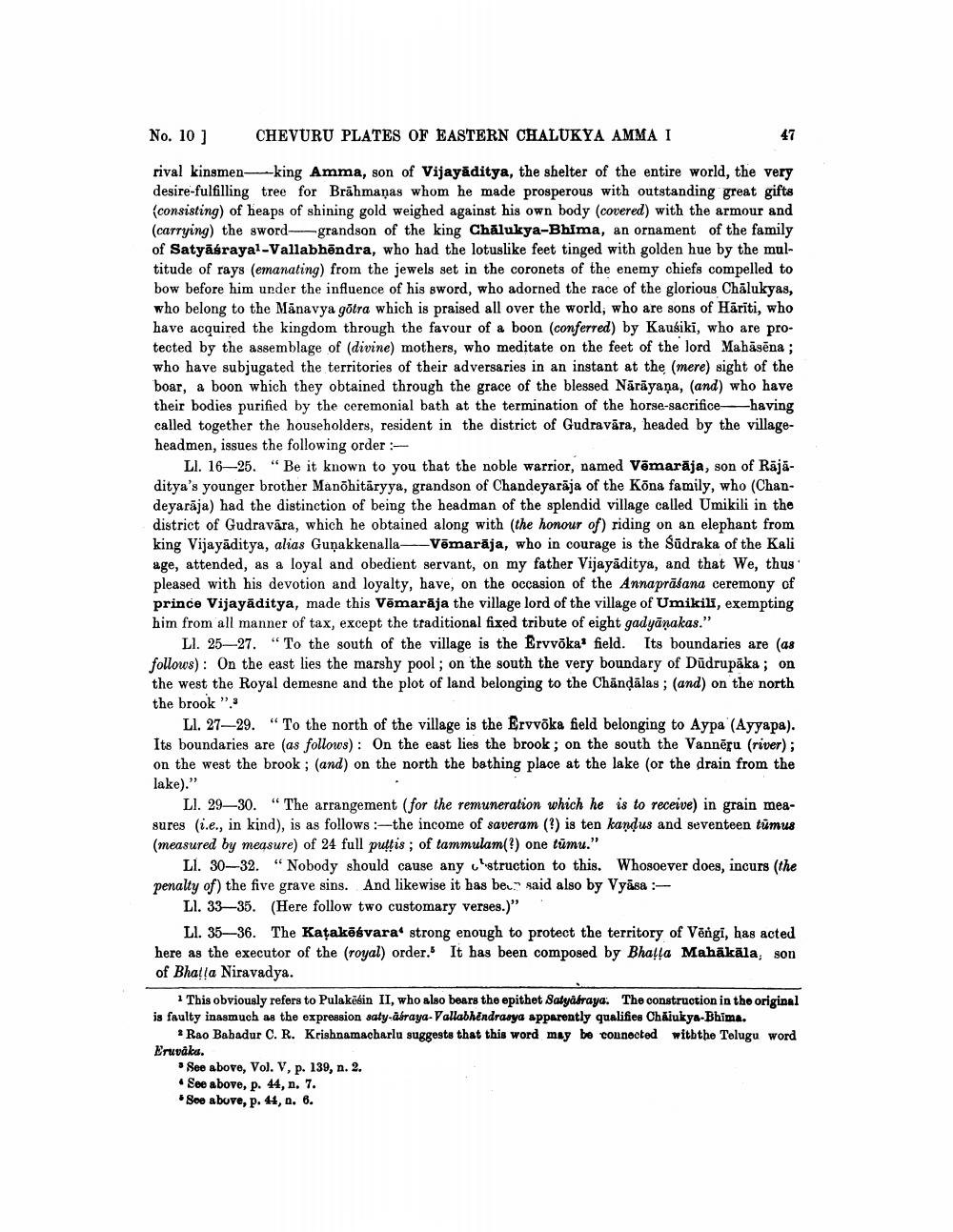________________
No. 10 ]
CHEVURU PLATES OF EASTERN CHALUKYA AMMA I
rival kinsmen- king Amma, son of Vijayāditya, the shelter of the entire world, the very desire-fulfilling tree for Brāhmaṇas whom he made prosperous with outstanding great gifts (consisting) of heaps of shining gold weighed against his own body (covered) with the armour and (carrying) the gword grandson of the king Chalukya-Bhima, an ornament of the family of Satyasrayal-Vallabhöndra, who had the lotuslike feet tinged with golden hue by the multitude of rays (emanating) from the jewels set in the coronets of the enemy chiefs compelled to bow before him under the influence of his sword, who adorned the race of the glorious Chālukyas, who belong to the Mänavya götra which is praised all over the world, who are sons of Hārīti, who have acquired the kingdom through the favour of a boon (conferred) by Kausiki, who are protected by the assemblage of (divine) mothers, who meditate on the feet of the lord Mahäsēna ; who have subjugated the territories of their adversaries in an instant at the (mere) sight of the boar, a boon which they obtained through the grace of the blessed Nārāyaṇa, (and) who have their bodies purified by the ceremonial bath at the termination of the horse-sacrifice having called together the householders, resident in the district of Gudravára, headed by the villageheadmen, issues the following order :
LI. 16-25. "Be it known to you that the noble warrior, named Vēmarāja, son of Rājāditya's younger brother Manõhitaryya, grandson of Chandeyarāja of the Köna family, who (Chandeyarāja) had the distinction of being the headman of the splendid village called Umikili in the district of Gudravāra, which he obtained along with the honour of) riding on an elephant from king Vijayaditya, alias Gunakkenalla Vēmarāja, who in courage is the Südraka of the Kali age, attended, as a loyal and obedient servant, on my father Vijayāditya, and that We, thus pleased with his devotion and loyalty, have, on the occasion of the Annaprāšana ceremony of prince Vijayāditya, made this Vēmarāja the village lord of the village of Umikili, exempting him from all manner of tax, except the traditional fixed tribute of eight gadyānakas."
Ll. 25-27. "To the south of the village is the Ervvāka field. Its boundaries are (as follows): On the east lies the marshy pool ; on the south the very boundary of Dūdrupāka; on the west the Royal demesne and the plot of land belonging to the Chåndālas ; (and) on the north the brook".
LI. 27–29. "To the north of the village is the Ervvőka field belonging to Aypa (Ayyapa). Its boundaries are as follows) : On the east lies the brook; on the south the Vannēsu (river); on the west the brook ; (and) on the north the bathing place at the lake (or the drain from the lake)."
Ll. 29–30. “The arrangement (for the remuneration which he is to receive) in grain measures (i.e., in kind), is as follows: the income of saveram (?) is ten kandus and seventeen tumus (measured by measure) of 24 full puttis ; of tammulam(?) one tümu."
Ll. 30–32. "Nobody should cause any 'struction to this. Whosoever does, incurs (the penalty of the five grave sins. And likewise it has be... said also by Vyasa :
Ll. 33–35. (Here follow two customary verses.)"
Ll. 35—36. The Katakēsvara strong enough to protect the territory of Vengi, has acted here as the executor of the (royal) order. It has been composed by Bhaļļa Mahākāla, son of Bhalla Niravadya.
1 This obviously refers to Pulakësin II, who also bears the epithet Satyäfraya. The construction in the original is faulty inasmuch as the expression saty-a-raya-Vallabhëndrasya apparently qualifies Chalukya-Bhima.
2 Rao Babadur C. R. Krishnamacharlu suggests that this word may be connected with the Telugu word Eruvāka.
* See above, Vol. V, p. 139, n. 2. . See above, p. 44, n. 7. Soe above, p. 44, . 6.




